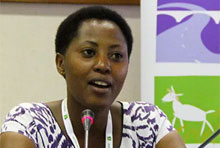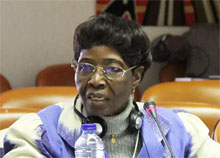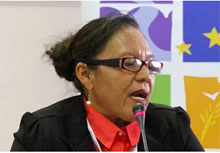
Brussels, 29 September 2015/ CTA/ ACP: Five women entrepreneurs from Sub-Saharan Africa, the Caribbean and the Pacific gave fascinating accounts of starting and managing agribusinesses, as part of the 42nd Brussels Development Briefings hosted at the ACP Secretariat, on the theme: ‘Women entrepreneurs – key players in ACP agribusiness development’.
The presentations on 17 September covered factors that had driven their success and the challenges they face.
The seminar was part of the Brussels Development Briefings series, which focuses on important issues and challenges for rural development, in the context of ACP-EU cooperation. The ACP-EU Technical Centre for Agricultural and Rural Cooperation (CTA) organises the series, along with the DG DEVCO from the European Commission, the ACP Secretariat and several other bodies.
CTA reports of the event:
The entrepreneurs’ stories
1. Lovin Kobusingye, Kati Farms, Uganda (pictured above)
Kati Farms links several hundred smallholder fish farmers, most of whom are women, to supermarkets, hotels, restaurants and street vendors in Uganda, and also exports to Kenya, Burundi and Sudan. Lovin Kobusingye, the Managing Director, started the company in 2011. It is now worth an estimated USD 0.5 million. She says she has achieved this remarkable success by pioneering new products, such as her unique fish sausages.
The importance of innovation
Ms Kobusingye’s flagship product is fish sausages: “I needed an innovative product to penetrate the market”, she says. For eight months she worked on developing the product, assisted by the Uganda Industrial Research Institute. “People told me, Lovin, you’re crazy, that can’t be done here”, but despite such initial scepticism, the sausages have been a great success. Kati Farms now employs 38 people, 80% of whom are women, to process 1,500 kg of fish per week. In the company’s modern production plant, they turn the fish into samosas, fillets and other value-added products, as well as sausages.
Factors for success
Ms Kobusingye attributes her business success to several factors:
-
Gaining the trust of fish farmers, who supplied her on credit at first
-
Corporate governance training, funded by Oxfam
-
Creating innovative products which meet the current generation’s needs
-
Winning cash awards, which enabled her to invest in equipment
-
Participating in trade shows, enabling her to make new business contacts.
2. Simone Zoundi, Sodepal, Burkina Faso

Sodepal is a food processing business with a mission to fight malnutrition, which its Chief Executive Officer, Simone Zoundi, describes as “a scourge in the Sahel”. Using produce such as millet, honey and fruit, Sodepal has created a wide range of nutritionally-rich products including: cakes and biscuits, baby foods, drinks and sweets. In Burkina Faso the products are sold through pharmacies, supermarkets and NGOs. Sodepal also exports to neighbouring Mali and Niger. The business now has an annual income of 235 million Euros and provides cash incomes for many smallholder farmers.
Challenges
Ms Zoundi was clear about the challenges that Sodepal, like many other small and medium enterprises in Africa, faces:
-
An underdeveloped market due to household poverty
-
Limited access to credit
-
Fraud and corruption
-
Lack of a reliable energy supply.
3. Alberta Vitale, Women in Business Inc., Samoa
Alberta Vitale is an Associate Director of Women in Business Inc. (WIBDI) in Samoa. She shared her experiences of running Organic Farm to Table (OFT). OFT has created a sustainable value chain supporting more than 60 female smallholders by:
-
Encouraging hotels and restaurants to use locally-grown organic produce
-
Training chefs and rewriting menus to make better use of local foods and cuisine
-
Providing micro-finance and other training to farmers
-
Supplying seeds and seedlings to farmers
-
Linking farmers to markets
-
Assisting farmers to obtain organic certification.
-
Products and customers
OFT produces a wide range of vegetables, fruits and herbs, and exports: virgin coconut oil, dried lady finger bananas, coffee, cacao and fetau oil (a high value product used in cosmetics manufacture). Securing a contract in 2007 to supply virgin coconut oil to Body Shop International was a notable success. Its overseas customers also include All Good Organics and C1 Espresso in New Zealand.
Thanks to OFT, many smallholders have a regular income for the first time. Ms Vitale shared some of the lessons she had learned from OFT: “We need to identify roles in the value chain that women feel comfortable with.” She also stressed the importance of developing new products.
4. Rosemund Benn, Pomeroon Women’s Agro-Processor Association, Guyana
The Pomeroon Women’s Agro-Processor Association was launched in 2001 as a community response to two problems. Huge amounts of locally-grown fruits were spoiling due to the lack of a market for them. Meanwhile, many local women, including female household heads, had no paid work.
Rosemund Benn, who is President of the Association, described how it began with 14 women supplying five local shops with a starfruit cake mix. Thanks partly to support from organisations such as the Caribbean Network of Rural Women Producers (CaFAN), the Association has grown. It now buys produce from several hundred smallholders and produces a range of branded items including sauces and fruit wine. It supplies supermarkets in the Guyanan capital Georgetown and more than 100 small shops.
Successes
Specific successes so far include:
-
Successfully developing the Association’s brand, Pomeroon Delight
-
Winning a prestigious UN prize for its virgin coconut oil in 2010
-
Exporting virgin coconut oil to St Vincent and Antigua.
Challenges
The Association still faces difficulties, not least the problem of moving people and goods around a remote rural area where boats are often the only means of transport. Yet despite the challenges, the Association’s many members are managing their own enterprises, earning cash, and, for the first time, interacting with people from outside their own area. Ms Benn spoke of her own growing self-confidence through her work with the Association: “At first I was very shy; today I think I can face the President!”
5. Tepsy Ntseoane, Eve’s Eden, South Africa
Tepsy Ntseoane set up and runs Eve’s Eden Farming Enterprise, an agribusiness situated south of Johannesburg which supplies beef to restaurants and hospitals. She describes herself as an “intellectual farmer” whose “book is the land”. As well as raising cattle, she also grows and processes her own maize feed, despite a lack of modern equipment. Ms Ntseoane is proud of the fact that she employs several workers, ensuring financial security for their households. She has also set up a social programme, Gauteng Rural Development, to fight poverty among women and people with disabilities. As for the business, her plans include establishing an abattoir.
Empowering women
There are many reasons why development agencies should be supporting women’s economic empowerment. It is a means for women to achieve their potential and advance their rights, as well as an indispensable strategy for reducing poverty. These five inspiring stories show that there are exciting opportunities for supporting women’s agribusinesses across the ACP. You can find out more by following the links below.
Resources
Watch the videos
Download the presentations

 Sodepal is a food processing business with a mission to fight malnutrition, which its Chief Executive Officer, Simone Zoundi, describes as “a scourge in the Sahel”. Using produce such as millet, honey and fruit, Sodepal has created a wide range of nutritionally-rich products including: cakes and biscuits, baby foods, drinks and sweets. In Burkina Faso the products are sold through pharmacies, supermarkets and NGOs. Sodepal also exports to neighbouring Mali and Niger. The business now has an annual income of 235 million Euros and provides cash incomes for many smallholder farmers.
Sodepal is a food processing business with a mission to fight malnutrition, which its Chief Executive Officer, Simone Zoundi, describes as “a scourge in the Sahel”. Using produce such as millet, honey and fruit, Sodepal has created a wide range of nutritionally-rich products including: cakes and biscuits, baby foods, drinks and sweets. In Burkina Faso the products are sold through pharmacies, supermarkets and NGOs. Sodepal also exports to neighbouring Mali and Niger. The business now has an annual income of 235 million Euros and provides cash incomes for many smallholder farmers.


